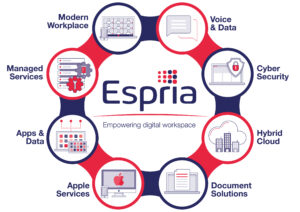Persistent cyber threats, rapidly changing technology, and the growing array of regulations have heightened the need for alignment between cybersecurity and compliance management. In its annual Digital Defence Report, Microsoft has sounded the alarm on the escalating number of cyberattacks with a 2.75-fold increase in ransomware attacks year-on-year and tech scams rising by 400% since 2022.
“In the world of business, you’ll inevitably hear about the many ways to beef up your cybersecurity to secure your boundaries and data. The higher level of sophistication in todays cyber-attacks, means there is even more expectation on a governance framework to be able to counter them,” said Richard Puckey, Head of Compliance at Espria.
“Leaders within these sectors are now at a crossroads; focusing on developing agile cybersecurity or strengthening their compliance framework. However, this perceived dilemma could actually be an opportunity to move away from compartmentalising the two strategies and merge both into a cohesive system where each supports the other.
“Blanket compliance without shaping to meet the specific requirements of the organisation diminishes its value. Governance frameworks must be modular to accommodate for different proprietary technologies and rising threats. An approach to this effect will provide a well-rounded system whereby compliance becomes part and parcel of the overall security strategy.”
Puckey adds that “regularly reviewing and enhancing internal governance frameworks can provide an invaluable opportunity to identify unknown vulnerabilities and refine policies.
“As organisations continue to embrace advanced technologies and integrate digital tools, they open a wider, dynamic regulatory landscape that expands the avenues threat actors are able use to compromise the corporate network. These gaps can be overlooked in traditional security setups, leaving holes within your framework.
“During compliance reviews, existing processes are evaluated to see whether they are valid or as effective as they could be. This can give businesses the opportunity to improve these areas, smoothing out inefficiencies and resolving minor issues that had gone unnoticed or were being managed with workarounds.
“Would these issues be identified without going through the certification process? Possibly, but it’s likely that they would have remained low priority in the face of more immediate concerns and potentially unravel into larger issues down the line.”
These benefits aren’t just internal – a dual focus on regulatory compliance and cybersecurity can demonstrate a clear commitment to the safety of customer data and help to attract new business leads.
“One question that often arises is whether the time and money spent on obtaining certifications is worthwhile or just an ‘investment in paper.’ But all good relationships are built on trust and customers are increasingly looking for proof of strong security and compliance to ensure their data is safe,” said Puckey.
“An effective cyber security strategy can act as the frontline defence against data breaches, reducing the risk of non-compliance and potential legal consequences. Coupled with regular risk assessments and maintaining consistent audit trails, organisations can signal their commitment to protect customer data and demonstrate their trustworthiness to the clients and stakeholders.”
While mastering this process is essential, it can be complex, but Managed Service Providers (MSPs) such as Espria, emerge as an indispensable partner in the modern business landscape.
“Navigating diverse regulations and complex cyber environments demands specialised knowledge and if misinterpreted, can lead to hefty penalties. MSP’s offer invaluable expertise to help businesses implement offerings tailored to the specific industry you function in, and create a secure, compliant work environment. This cost-effective solution provides expertise and dedicated tools that support long-term strategic goals without the need for major capital investment.”
Puckey concluded, “New cyber security threats are introduced every day and a single breach can damage your company’s reputation. When they are planned and executed correctly, compliance standards can be an invaluable tool when paired with a broader security strategy.
This alignment allows companies to stay agile in the face of evolving threats while demonstrating their commitment to safeguarding customer data.”

